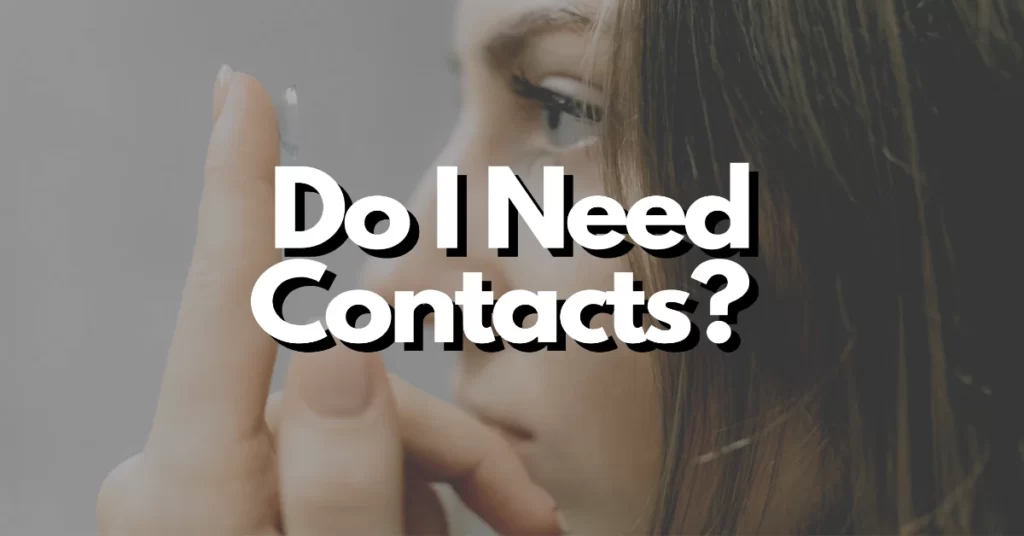Clear vision is a precious gift that allows us to navigate the world confidently. However, not everyone is blessed with perfect eyesight, and it’s essential to recognize the signs that may indicate the need for vision correction. Contact lenses are a popular and effective solution for a wide range of vision issues.
In this article we will explore the various signs and scenarios that suggest you may need contacts, as well as the safety implications of uncorrected vision.
Signs That You May Need Contacts
Understanding Your Visual Acuity is crucial. The term “20/20 vision” is often thrown around, but what does it really mean? It signifies that at 20 feet, you can see what a person with normal vision sees at that distance. If you find that your vision isn’t as sharp as it should be, it might be time to consider vision correction.
One of the most common signs that you may need contacts is blurry vision. Whether objects appear fuzzy up close or at a distance, this is a clear indicator that something is amiss with your vision. This blurriness can be due to conditions like nearsightedness, farsightedness, or astigmatism.
Difficulty reading small print is another sign. If you find yourself squinting or holding reading material at arm’s length to make out the words, you likely have a refractive error that needs correction.
Frequent headaches can also be a clue. Straining to see clearly for extended periods can lead to eye strain and tension headaches. Correcting your vision may alleviate these discomforts.
Eye fatigue is a common complaint in the digital age. Spending long hours staring at screens or reading can lead to tired, dry eyes. If this fatigue is a regular occurrence, it’s time to consult an eye care professional.
Sometimes, we don’t even realize we’re doing it, but squinting is a subconscious response to poor vision. When you squint, you temporarily change the shape of your eye, which can help you see more clearly. However, it’s not a long-term solution.
Scenarios That Require Corrected Vision
Your vision plays a significant role in your professional life. Certain careers, such as pilots, law enforcement officers, or military personnel, may require perfect or near-perfect vision. Even if your job doesn’t have specific vision requirements, uncorrected vision issues can impact your performance.
Driving and Vision: Clear vision is crucial for safe driving. Laws in many places mandate that drivers with vision problems must wear corrective lenses while driving. Failure to do so could not only lead to accidents but also legal consequences.
In the realm of education, good vision is paramount. Students rely heavily on their sight to absorb information. If a child or adult has uncorrected vision issues, their academic success may be compromised. Proper vision correction can make a world of difference in learning.
Additionally, sports and activities often necessitate precise vision. Athletes depend on their eyes to track fast-moving objects, judge distances accurately, and react swiftly. Corrective lenses, including contacts, can enhance their performance.
Safety Implications of Poor Vision
Beyond the professional and academic aspects of life, uncorrected vision can pose serious safety risks. Everyday activities become hazardous when you can’t see clearly.
Imagine walking up a flight of stairs with blurred vision; it’s a recipe for a misstep and a potential fall. Similarly, crossing roads or identifying hazards while walking or driving can be perilous with compromised vision.
Nighttime Vision is another concern. Poor vision makes it challenging to navigate in low-light conditions. It affects your ability to drive safely at night, identify objects in dimly lit environments, and maintain situational awareness.
Reduced reaction time is a significant safety concern. When you can’t see an obstacle clearly or misjudge distances, your reaction time to avoid accidents is compromised. In critical situations, this can have dire consequences.
Vision Correction Options
Considering Contact Lenses: If you’ve recognized any of the signs or scenarios mentioned above, it’s time to explore vision correction options. One of the most popular choices is contact lenses.
Contact lenses come in various types, each suited to different needs. Daily disposables are convenient for those who prefer a fresh pair each day. Extended wear lenses can be worn continuously for an extended period. Specialized lenses, like toric lenses for astigmatism or multifocal lenses for presbyopia, address specific vision issues.
The benefits of contacts are numerous. They provide enhanced peripheral vision compared to glasses, allowing you a more natural field of view. Contacts also don’t fog up in cold or humid conditions, making them suitable for various environments.
However, before obtaining contact lenses, it’s crucial to schedule an eye exam with a qualified eye care professional. They will assess your vision, determine the correct prescription, and ensure your eyes are healthy and suitable for contacts.
Conclusion
In conclusion, recognizing the signs and scenarios that suggest you may need contacts is essential for maintaining both your vision and safety. Vision correction can significantly improve your quality of life, whether it’s for professional, academic, or everyday activities.
If you suspect you may need contacts, consult an eye care professional who can guide you towards the best vision correction option for your needs.
